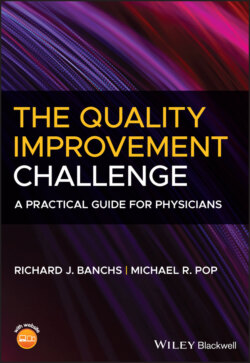Читать книгу The Quality Improvement Challenge - Richard J. Banchs - Страница 18
WHAT IS THE PHYSICIAN’S ROLE IN PROCESS IMPROVEMENT?
ОглавлениеIt is widely accepted that physician engagement is an essential requirement for any successful quality improvement project, and yet we have not seen the full engagement of clinicians. Physicians have a pivotal role within the organization. However, they are often not involved in healthcare organization improvement efforts, either because of the constraints of their overbooked clinical schedules or because of the perception that they are not directly responsible for the improvement of the operational aspects of delivering care.
Physicians express a strong support for QI projects, but often have a different view of what this entails. Although this is probably not you (the reader!), physicians in general
View improvement projects as taking time away from patient care, interfering with their schedule, and adding complexity to their workflow, even when that very workflow is the cause of the problem. This unfavorable view of QI projects is further perpetuated when their improvement efforts are not recognized with professional advancement or other incentives.
Are often reluctant to participate in QI projects because they believe the improvement initiative will be ineffective.
View quality assessment as an integral element of the practice of medicine and resist any improvement initiative that challenges this view.
View clinical guidelines and pathways as hampering individual provider’s freedom.
Have a lack of expertise in project management, team dynamics, and communication.
Physicians have historically been responsible for the quality of clinical care by virtue of their credentials. This has resulted in their implicit expectation that the burden of operational improvement should be left to staff and hospital administration, a tenet described by Kornacki as “The Physician Compact” (Kornacki 2012): “The Physician Compact is an implicit psychological contract that defines the actions physicians believe are expected of them and the response they expect in return from their employers.”
According to this compact, physicians believe their role is to treat patients, provide quality care (as defined by the physician), advance research, and support medical education. In return, they expect to be given clinical autonomy, protection from market forces, and the resources needed to resolve operational problems. In contrast, hospitals and healthcare organization need standardization, improved efficiencies, lower costs, and physician engagement in operational challenges. There is an internal incongruence between physicians’ expectations and hospital needs that results in resentment, misunderstandings, and a lack of physician engagement in operational improvement (Kornacki 2015). Efficiency and standardization are often perceived by physicians as a restriction to their ability to integrate their knowledge, experience, and assessment skills in their clinical practice. Ironically, it is often the physicians who initially identify processes that are dysfunctional and are open to becoming engaged in “their project” when there is adequate facilitation and coordination by another staff member.
